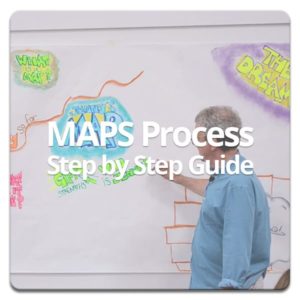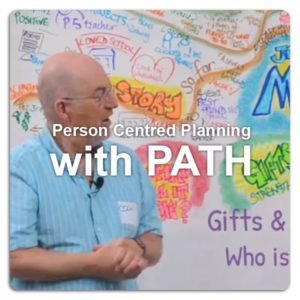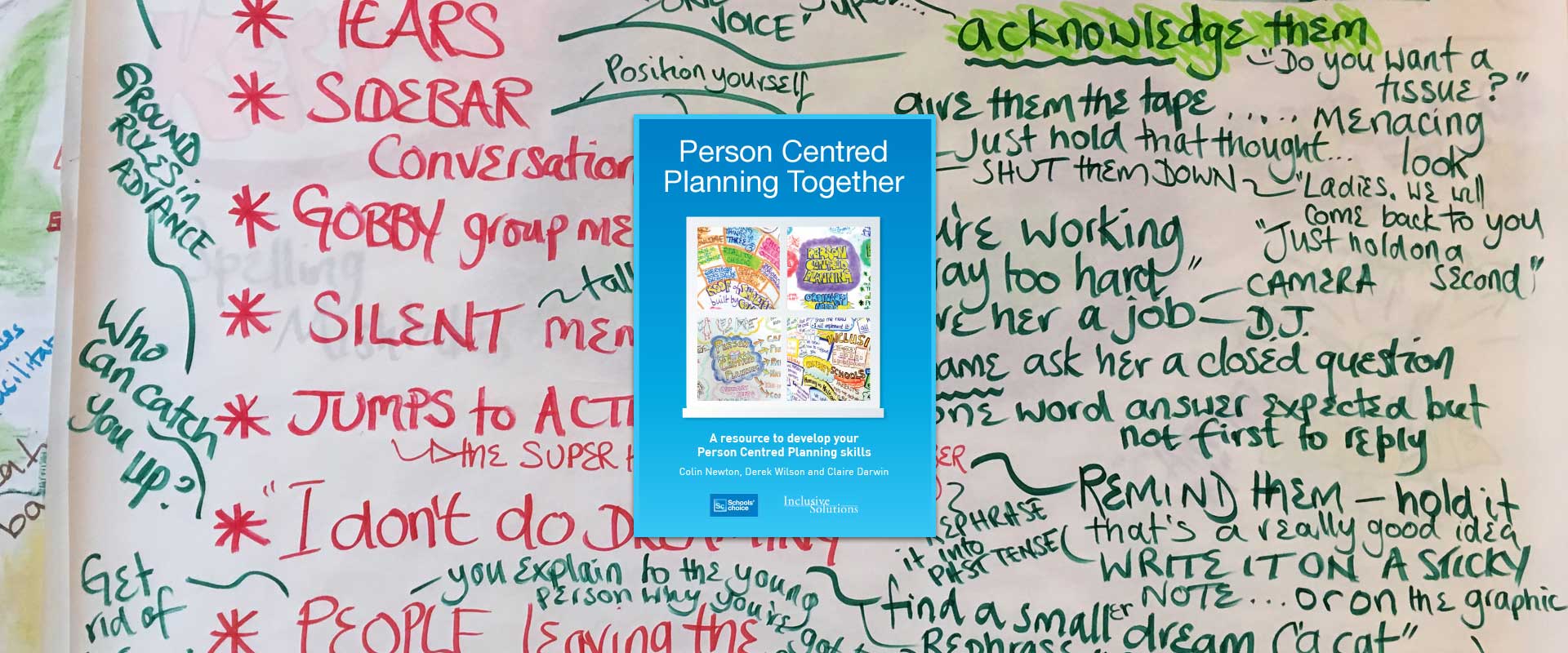
Person Centred Planning
What is a Person Centred Approach?

History
Person Centred Planning was first developed in the 1980’s by a small number of people including John O’Brien, Connie Lyle O’Brien, Beth Mount, Jack Pearpoint, Marsha Forest and Michael Smull. It was developed as a way of enabling people – children and adults – to move out of special segregated places schools, hospital and institutions into mainstream life – schools and communities. Person Centred Planning is built on the values of inclusion and looks at what support a person needs to be included and involved in their community.
Person centred approaches offer an alternative to traditional types of planning which are based upon the medical model of disability and which are set up to assess need, allocate services and make decisions for people. Person centred planning is rooted in the social model and aims to empower people who have traditionally been disempowered by ‘specialist’ or segregated services by handing power and control back to them.
Hear a podcast featuring Colin about his time as an EP, including work on PATH, inclusion and hope
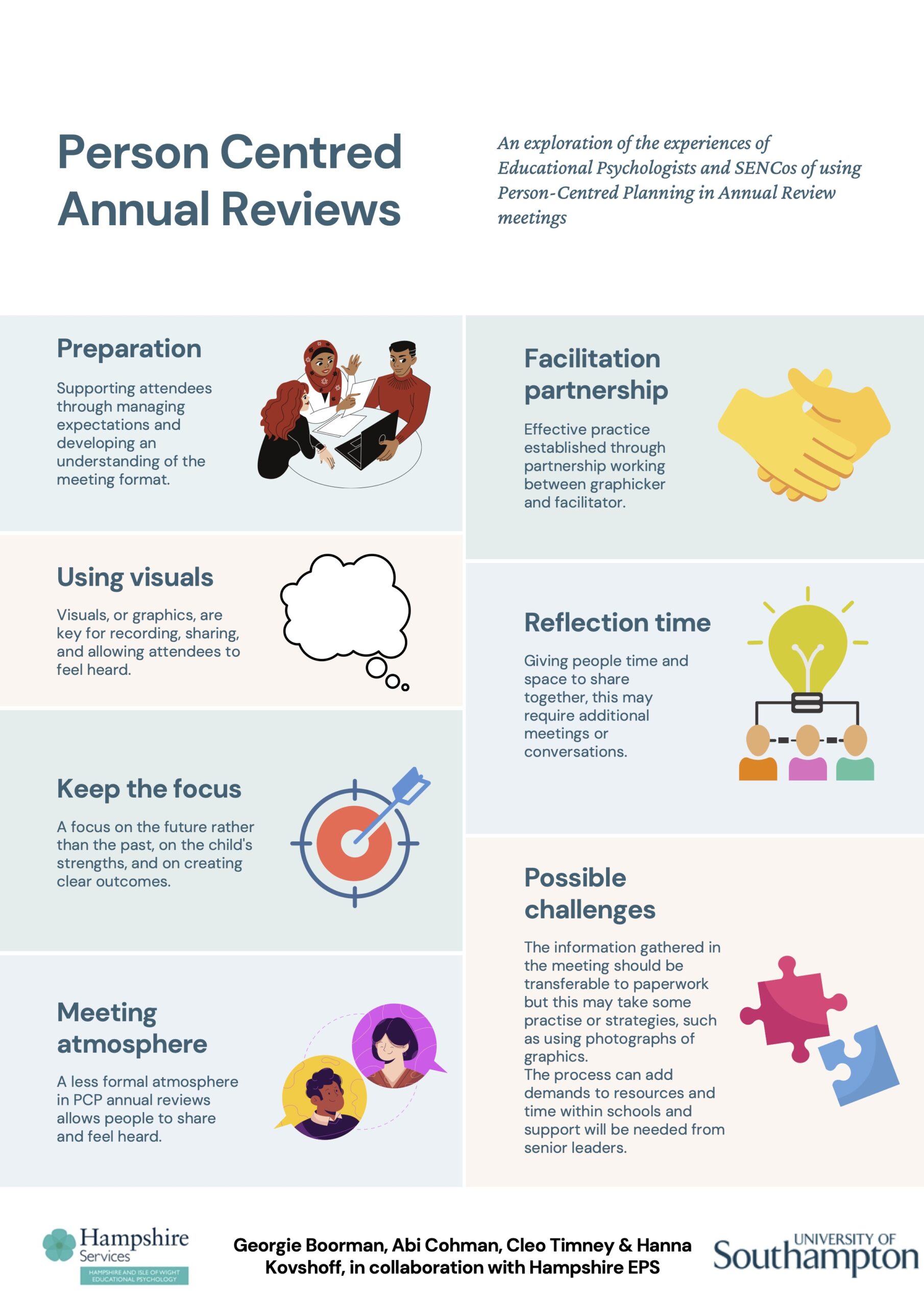
The University of Southampton have made a concise, A4-sized exploration of Person Centred Annual Reviews
Planning for a good life is at the heart of this work. Read Colin Newton’s thoughts on this pursuit..
We have a range of experienced facilitators working with us here at Inclusive Solutions available for family, team or organisational planning.
What makes a review or planning meeting person centred? You will know when a meeting is really person centred – you will see and feel the difference – Check out Facilitating a person centred review
“Person centred planning is a way of organising around one person to define and create a better future”
(Pete Richie, 2002)
Person Centred Planning is not one defined process, but a range of processes all sharing the same underpinning values base and goal – to help a person who has been disempowered – for what ever reason – to move toward the life that they want and to get the right support in doing this. Although person centred planning was developed for disabled people it is a tool for everyone.
What do people say about our Person Centred Planning work?
Very little research has taken place into person centred planning, however vol. 27 number 4 of the TASH journal (2002) was partly devoted to the theme of evaluating Person Centred Planning and contains a strong paper by John O’Brien on the kind of research mindset that he feels will best serve the values of this area of work.
Inclusive Solutions have been using these processes since 2001 in an ever widening range of situations including Personal Education Planning (PEP) meetings for Looked after young people, Team around the Child (TAC) meetings, Educational and Health Care Planing (EHCPs) mapping in Social Care settings, pre and post exclusion planning meetings and a whole variety of transition planning meetings. Whole team planning has allowed work with whole school staff, amalgamating teams, Local Authority teams, conflicted services and so on. Work with families and around children and young people of all ages.
Valuing People Now
“Person centred planning has been shown to work. The world’s largest study into person centred planning described how it helps people get improvements in important parts of their lives and indicated that this was at no additional cost”. But – “too few people have access to proper person centred planning… In too many local authorities, person centred planning is not at the centre of how things are done. The challenge of the next three years is to take all this innovative work and make sure that more – and eventually all – people have real choice and control over their lives and services”
Valuing People Now, Department of Health, December 2007
What about when there is not enough support to follow the PATH?
Inclusion Facilitation
In recent years Inclusive Solutions have been visiting the Czech Republic to offer training on Person Centred Planning. Together we have had some remarkable experiences and there has been some wonderful implementation of this inclusive way of working. This document reveals some of the work and thinking that has occurred.
Czech Republic Approach to PCP
Why Person Centred Planning is important in the UK Now?
The Children and Families Act 2014 sets out clear principles for supporting and involving children and young people in all aspects of the support and planning of their special educational need. The Special Educational Needs and Disability Code of Practice: 0 – 25 years provides the statutory guidance relating to part 3 of the Children and Families Act 2014. Embedded in its principles is the need for a stronger focus on the participation of children, young people and their parents/carers in decision making at both individual and strategic levels. The use of Person Centred Approaches provides the opportunity to fulfil those principles. Working in this way ensures the CYP and their parents/carers are at the centre of all decision making and future planning.
It provides an opportunity to engage directly with children and young people to discuss their needs, and plan how they can achieve the best possible outcomes. This should be integral to all planning for children and young people with Special Educational Need and Disability (SEND) throughout their lives.
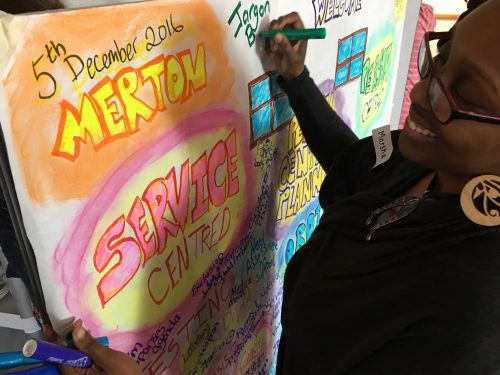
Education Health Care Planning processes are required to be truly person centred at every stage, including annual reviews, so understanding this way of working has never been more essential.
“The assessment and planning process should:
- focus on the child or young person as an individual
- enable children and young people and their parents to express their views, wishes and feelings
- enable children and young people and their parents to be part of the decision-making process
Page 136
- be easy for children, young people and their parents or carers to understand, and use clear ordinary language and images rather than professional jargon
- highlight the child or young person’s strengths and capabilities
- enable the child or young person, and those that know them best to say what they have done, what they are interested in and what outcomes they are seeking in the future
- tailor support to the needs of the individual
- organise assessments to minimise demands on families
- bring together relevant professionals to discuss and agree together the overall approach, and
- deliver an outcomes-focused and co-ordinated plan for the child or young person and their parent
This approach is often referred to as a person-centred approach. By using this approach within a family context, professionals and local authorities can ensure that children, young people and parents are involved in all aspects of planning and decision-making.Types of Planning
These tools were developed by Jack Pearpoint, Marsha Forest and John O’Brien to help marginalised people be included in society and to enable people to develop a shared vision for the future.
West Sussex work on Person Centred Planning – lots of great examples of work in schools and across the LA are described here following the training by Inclusive Solutions team over a number of years.
Types of Planning – MAPs & PATH
MAPS and PATH are creative planning tools that utilise graphic facilitation to collect information and develop positive future plans. MAPS focuses on gathering information for planning – based on the story (history) of a person or organization. Person centred planning is a way of expressing a set of inclusive values through a unique range of tools and techniques. The most commonly used person centred tools – MAPS and PATH – create a hands-on demonstration of these values in action. These are especially effective tools in planning transitions and annual review processes for young people with additional support needs and for through-care planning for young people who are looked after or accommodated.
MAP and PATH can be used with individuals and their circle of support, families teams and organisations.
Both MAP and PATH are facilitated by two trained facilitators – one process facilitator who guides people through the stages and ensures that the person is at the centre and one graphic facilitator who develops a graphic record of the conversations taking place in the room.
MAPs
- Hosted on Teachable – world famous platform
- Self paced learning
- Learn a great tool for inclusion
- Learn how to create a shared vision of a positive future
Sign up today.
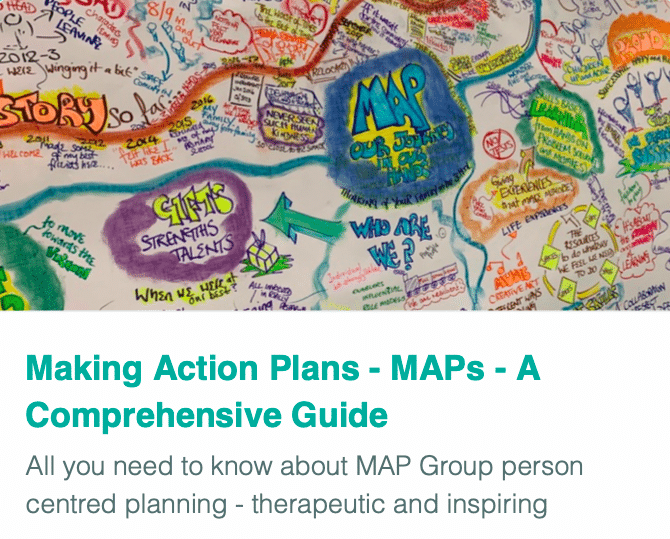
PATH
- Hosted on Teachable – world famous platform
- Self paced learning
- Learn a great tool for inclusion
- Learn how to create a shared vision of a positive future
Sign up today.
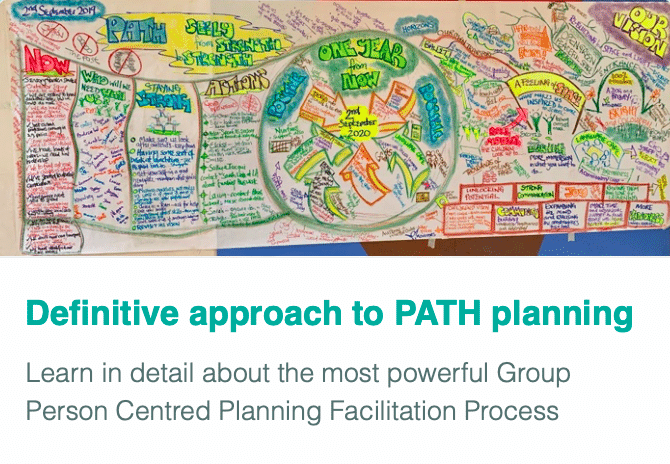
Essential Lifestyle Planning – One Page Planning – Child Centred Reviews
Essential Lifestyle Planning is a method of planning that was developed by Michael Smull and Susan Burke-Harrison to support people who were moving out of institutions into their communities to ensure that learning about what is important to people and what support they need was captured and used.
An essential lifestyle plan focuses on what is important to someone now and balancing this with things that we need to know or do to keep the person healthy, happy and safe. An essential lifestyle plan should always have a action plan and it is vital that the plan changes and grows as the person is – it is a living document.
Essential Lifestyle Planning is slowly being replaced with one page profiles and living descriptions on the premise that makes sense to start small and build on our learning. Many of the same tools are used – these tools are called the person centred thinking tools.
Essential Lifestyle Planning has informed many of the questions posed in Stephen’s book. Radically change your IEP and review work today!!

All about Joe
Another fine example was created by Joe and his family and friends just before secondary transfer. It has already proved invaluable.
Feel free to also check out Babu‘s and Niki‘s One Page Plans
School Improvement
Person Centred Planning really works
Sharon Gray (OBE) – Teacher of the Year
Schools really value school improvement processes that involve all members of staff. The PATH process is ideal for this kind of work and not only supports collective planning but also has a powerful team building impact. Call Inclusive Solutions to talk though your school’s situation and we will come along and facilitate either a half full day with your full team – including staff, pupils, admin staff, midday supervisors, site manager and governors. We have evidence that this way of working brings whole school change and can accelerate progress towards being an outstanding in OFSTED’s terms or outstanding in being a truly great inclusive school!
Essex Academy PATH
‘We do lots of School Improvement planning and team building using person centred processes. We often use the PATH process and involve staff, pupils, parents, Governors, midday staff and so on.’
– A very experienced Secondary Academy School Governor says it all
Netherfield Primary School – Inclusive Solutions PATH
Netherfield Primary an OFSTED rated ‘Outstanding School – “We dare to dream…”
Three years of Inclusive Solutions facilitating the PATH process with this really inclusive school has contributed to the school’s development which was endorsed by OFSTED as outstanding.
It is crucial when developing the Netherfield vision that all stakeholders are authentically involved – that is children, families, staff, Governors, partners who support the school and all staff. The PATH – Planning Alternative Tomorrows with Hope – is a creative way of enabling all voices to be heard, recorded, ideas shared, dreams developed and then identifying positive and possible priorities. Together the entire group start to plan out the small steps to ensure our 5 key priorities will be achieved. Throughout this process it is clear that everyone develops ownership of the vision, is aware of their responsibility and indeed accountability. The vision is then displayed in a prominent place enabling everyone to physically and metaphorically touch the vision on a daily basis. Each year we share previous PATHs, allowing all stakeholders to walk the PATH of school improvement since September 2009. We find this a powerful way of planning and ensuring we achieve.
Excellent use of MAPs and Solution Circles to support inclusion in the Early Years and Foundation in Wolverhampton mainstream schools! Exemplary practice!
Getting Practical –
Graphics
Get the starter kit of Paper and Graphics Equipment here
Training and demonstration Offer
Training on Person Centred Planning can be provided as introductory workshops or full days or much more in depth over a number of days.
Local Authority/Multi Academy Trust Model:
One day introduction to underlying values and practicalities of approach in schools – 100 people
2 Day skill training for 30 participants to learn PATH planning skills
1 day follow up after 3 months to problem solve issues and celebrate what achieved.
For the full list of PCP Training we offer, click here.
We can join with you and your organisation to lead visioning, personal or organisational futures planning using tools such as MAPS or PATH around an individual person or a team searching for consensus and direction.
Inclusive Solutions can model and coach the use of a range of person centred planning processes with children, young people and adults, in collaboration with families and friends. We have and still are working with a number of education teams developing skills in the use of MAPS and PATH
These tools can replace reviews and transitional planning processes for many young people with high support needs and can break in to destructive cycles of blame and exclusion around young people labelled as ‘trouble’.
The focus of this work can include:
- children with challenging behaviour
- children with disabilities in transition
- teams planning their future
- schools visioning
- councillors clarifying their vision
- LA Teams planning ahead
- schools in special measures
- Education Action Zone planning
- and many more possibilities…
We actively work to include children and young people in problem solving and planning processes. Pictures, key words, and graphics help support our work. We have been busy this year facilitating PATHs and MAPS around the UK, for all kinds of reasons.
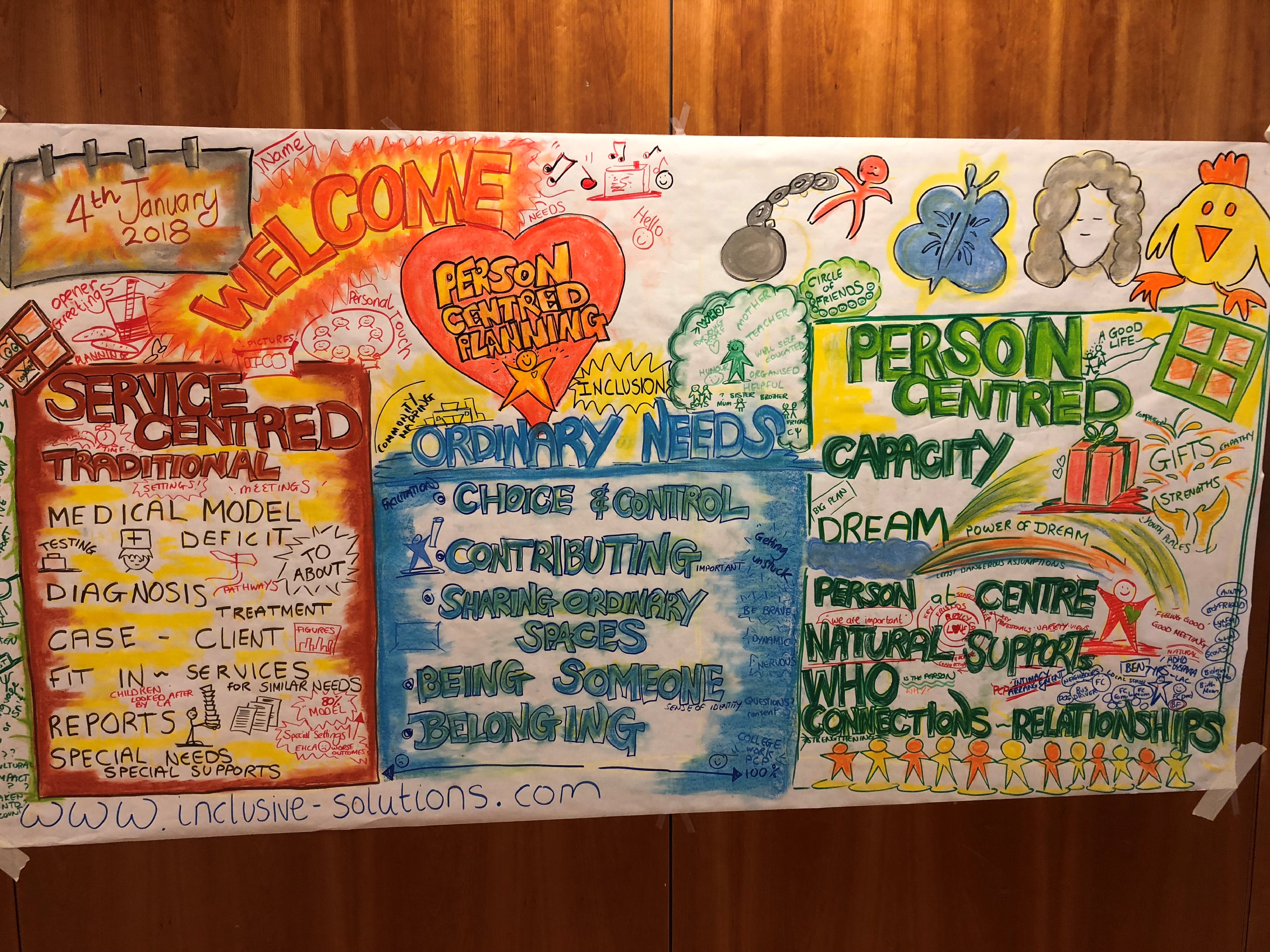
Marnie Aston Training Overview
Full list of Person Centred Planning training
Getting Practical…
In the UK we need to find much more person centred approaches to annual reviews, transition reviews, and all the rest! Our planning too needs to reflect our wish to respectfully involve the student in meaningful ways. Our Individual Education Planning (IEPs) could be so much more person centred and child friendly, both in process and actual plan produced.
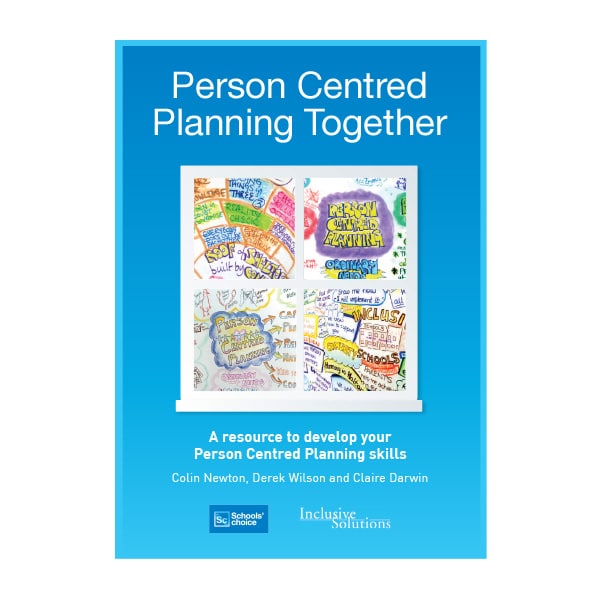
Read this! Great book with web resources to support – directly reflects our training days!
How should we reflect afterwards about our person centred work?
“Thanks for enabling me to become an ardent MAP seeker and a fellow PATH finder in our soul searching journey towards inclusion. Thanks for keeping our dreams alive and reminding us that we are never too old enough to set a new goal or to dream a new dream… believing and doing is the brush that converts our dreams into a masterpiece of reality.”
Parent
The 5 Service accomplishments
The 5 Service accomplishments – The 5 Ordinary needs that make up a good life!
Interested? Book a training day in-person or online!
Full list of Person Centred Planning training
-
 Paper Rolls for Graphics NEW£65.30
Paper Rolls for Graphics NEW£65.30 -
 Complete Graphics Toolkit£139.00
Complete Graphics Toolkit£139.00 -
 Facilitation and Training Props Resource£98.50
Facilitation and Training Props Resource£98.50

